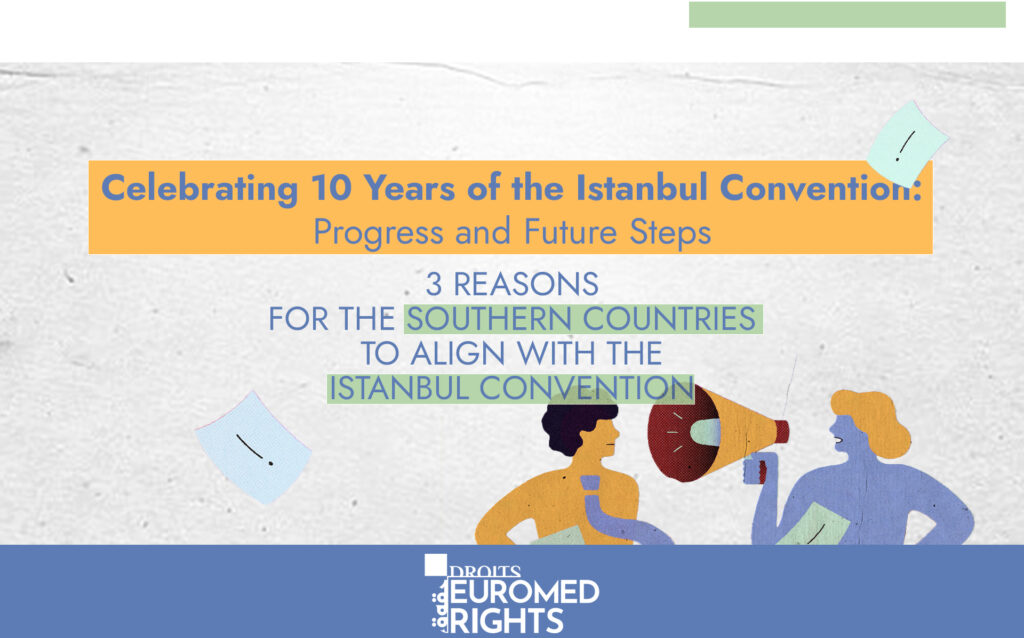As we celebrate the 10th anniversary of the Istanbul Convention’s entry into force on August 1st, it is essential to reflect on the progress made and the work still required to combat gender-based violence in the Euro-Mediterranean region.
The Istanbul Convention, formally known as the Council of Europe Convention on Preventing and Combating Violence Against Women and Domestic Violence, is a groundbreaking international treaty dedicated to addressing this pervasive issue. Despite its significance, many countries in the southern neighborhood, including Morocco, have yet to make critical steps towards aligning with the standards set by this essential convention. Additionally, Turkey has withdrawn, and Tunisia has yet to respond to the Council of Europe’s invitation to ratify this treaty.
Here are three compelling reasons why Morocco, Tunisia, and other Mediterranean countries should adhere to the principles and standards of the Istanbul Convention, and why Turkey should rejoin.
- Strengthening the legal framework to protect ALL women
By taking steps to align with the standards put forward by the Istanbul Convention, Morocco, Tunisia and other southern neighborhood countries would significantly enhance the legal frameworks for protecting women against violence. The Convention requires signatory states to implement comprehensive legal measures that criminalize all forms of violence against women, including domestic violence, sexual harassment, and psychological abuse.
While Moroccan Law 103-13 has made strides in addressing violence against women, it lacks a clear definition of violence and does not criminalize all forms of it as provided by the Istanbul Convention. Rachid Meziane, a legal expert, highlights this gap, emphasizing that “although existing Moroccan law covers some forms of gender-based violence recognized internationally, it does not guarantee common and shared interpretations among law practitioners”. By adhering to the principles of the Istanbul convention, Morocco can align its legal standards with international best practices, ensuring robust legal safeguards for women.
This lack of common and shared interpretation of what constitutes violence against women results in situations of discrimination where morality is protected to the detriment of women’s rights and dignity, as it is often the case for child marriage or violence that occurs outside of marriage. For Amina Lotfi, former President for the Democratic Association for the women of Morocco ADFM: “despite some achievements, Law 103-13 on combating violence against women needs revision as it does not protect all women from all forms of violence, and omits measures of protection, reparation, and sanction.”
- Support Services for Survivors
The Istanbul Convention emphasizes providing holistic support services for survivors of violence, including access to shelters, 24/7 helplines, medical care, psychological counseling, and legal assistance. In many southern neighborhood countries, such services are either limited or non-existent, leaving survivors without the necessary support to rebuild their lives.
Moroccan Law 103-13 does offer some protection and care for victims, but it does not mandate comprehensive support services as the Istanbul Convention does. Meziane points out that while there are measures for victim care, the coordination and availability of services remain insufficient compared to the holistic approach required by the convention. Aligning with the convention would permit the establishment and expansion of these essential services, offering survivors the support they need to recover and reintegrate into society.
In accordance with Law 103-13, support units were established within first instance courts and courts of appeal. These units are responsible for welcoming, listening to, guiding, and supporting women who are victims of violence. However, these units have been deemed unsuccessful and have had a very limited impact. The obstacles to their effectiveness include the lack of shelter services and the insufficient training of the personnel involved in these support units.
- Promoting Women’s Rights and Values of Equality
Gender-based violence is both a cause and consequence of gender inequality. By adhering to the principles and standards the Istanbul Convention, Morocco, Tunisia, and other southern neighborhood countries can demonstrate their commitment to promoting gender equality and combating all forms of discrimination against women. The convention not only addresses violence but also promotes prevention measures and policies aimed at eliminating gender stereotypes and discriminatory practices.
While Moroccan Law 103-13 includes some measures to promote gender equality, it does not explicitly address the broader cultural and societal changes necessary to combat deeply ingrained gender stereotypes. Meziane notes that the existing law falls short in promoting the preventive and educational measures emphasized by the Istanbul Convention, which are crucial for long-term change. Aligning with the Istanbul Convention would signal to civil society and citizens alike that governments and state institutions are serious about advancing women’s rights and creating societies where women can live free from violence and discrimination.
The Istanbul Convention represents a powerful tool for combating violence against women and promoting gender equality. For Morocco, Tunisia, and other southern neighborhood countries, aligning with this convention would elevate the stance for women’s rights, including stronger legal protections, enhanced support services, greater gender equality, fulfillment of international commitments, and a culture of accountability and prevention.
Furthermore, Turkey’s withdrawal from the convention was a significant setback for women’s rights and a departure from its pioneering role in establishing the treaty. Rejoining the Istanbul Convention would reaffirm Turkey’s commitment to protecting women from violence and set a positive example for the region.
Tunisia, which has yet to respond to the Council of Europe’s invitation to ratify the convention, should consider it. By ratifying the Istanbul Convention, Tunisia can demonstrate its dedication to women’s rights and resume implementation of the 2017 law, providing better protection and support for women facing violence.
As we celebrate the 10th anniversary of the Istanbul Convention, it is time for these countries to join the growing global movement against gender-based violence, demonstrating their commitment to protecting the rights and dignity of all women.

